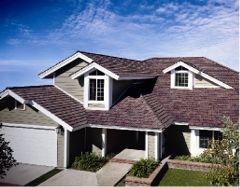What are concrete roof tiles?
Do you want the appearance of a tile roof but not the high cost? Consider beautiful, long-lasting, and economical concrete roofing tiles. In the middle of the 19th century, in Bavaria, a mixture of cement, sand and water was first used to form roof tiles out of concrete. Many homes built with these first concrete roof tiles still remain, proving their durability. In the early 1900s, coloring pigments were added to concrete roofing tiles in Europe to simulate the appearance of clay. While these early concrete tiles were handmade or made with semi-automated machines, innovation over the past century has automated production, making concrete tile more economical than other roofing products on a life cycle basis.
What are the advantages of concrete roof tiles?
 Concrete roof tiles most often last the lifetime of a house, typically carrying a limited lifetime, non-pro-rated, transferable warranty. Compare this to the limited warranties that accompany most composition shingles, and also how shorter lived products tend to overfill precious landfill space. Concrete tiles are Class A fire rated and resistant to damage from hail and high winds, typically achieving a minimum of a Class 3 hail resistance rating. Concrete tiles can sustain winds in excess of 125 miles per hour that would strip off most other roofing materials. Testing has also shown concrete tile roofing systems, when installed according to building code standards, exceed current seismic load requirements for building materials.
Concrete roof tiles most often last the lifetime of a house, typically carrying a limited lifetime, non-pro-rated, transferable warranty. Compare this to the limited warranties that accompany most composition shingles, and also how shorter lived products tend to overfill precious landfill space. Concrete tiles are Class A fire rated and resistant to damage from hail and high winds, typically achieving a minimum of a Class 3 hail resistance rating. Concrete tiles can sustain winds in excess of 125 miles per hour that would strip off most other roofing materials. Testing has also shown concrete tile roofing systems, when installed according to building code standards, exceed current seismic load requirements for building materials.
How much do concrete roof tiles cost?
Concrete tiles have grown more competitive in price, due in part to the rising costs of petroleumbased products such as asphalt shingles. Compared to unsightly weather-beaten asphalt shingles and their replacement costs, concrete roof tiles offer an affordable and economical alternative, especially when  considering their life cycle cost. Concrete tile roofs have experienced 100-year lives in Europe.
considering their life cycle cost. Concrete tile roofs have experienced 100-year lives in Europe.
What options do I have in selecting concrete roof tiles?
There are many style and color options available with concrete tile. Not limited to Sunbelt construction, concrete tiles can be used in cold climates provided specific installation precautions are followed. Modern concrete tile designs can simulate the appearance of traditional clay tiles, wood shake, slate and stone. Like clay, concrete tile surfaces can be textured or smooth, tile edges can be uniform or ragged, and architects may select tiles of all one color, blended colors or combinations of two or more shades placed in a uniform or random pattern. Regular portland cement is gray, but is also available in white. Pigments can be blended with either white or gray cement to allow for virtually any desired color, including bright whites, pastels and deep rich shades. Lightweight concrete tiles are also available in some regions of the country for re-roofing applications where the roof structure is insufficient to support standard weight concrete tiles.
How difficult is it to maintain concrete roof tiles?
 A yearly visual inspection of a concrete roof can help protect against accumulation of leaf debris in the valleys, or moss growth that could create a damming effect with rain. Moss and algae do not harm concrete tiles, but periodic cleaning with a power washer by a professional can remove them, and the use of biocides or zinc strips may be incorporated to slow the growth of these organisms. After periods of high winds, earthquake, or extensive hail, a visual inspection of the roof should also be made to ensure that there are no cracked, broken, or loose tiles needing replacement.
A yearly visual inspection of a concrete roof can help protect against accumulation of leaf debris in the valleys, or moss growth that could create a damming effect with rain. Moss and algae do not harm concrete tiles, but periodic cleaning with a power washer by a professional can remove them, and the use of biocides or zinc strips may be incorporated to slow the growth of these organisms. After periods of high winds, earthquake, or extensive hail, a visual inspection of the roof should also be made to ensure that there are no cracked, broken, or loose tiles needing replacement.
What should I look for to be sure I'm getting a quality installation?
A new roof is a big investment, so the quality of the roofing materials you are specifying and the reputation of the contractor are important considerations. According to the Tile Roofing Institute, there are several points to remember when choosing an installation contractor:
Referrals – Always obtain referrals from builders and homeowners who have used concrete tile contractors. Meet with them to get an appreciation for their commitment to quality and value in your job.
Look for a professional – Do they have a reputation for honesty and quality? Do they complete their jobs on time and within budget? Do they understand and abide by manufacturer specifications for installation?
Do your homework – Evaluate potential contractors’ insurance policies and record their professional license number so that you can ask your state’s Department of Professional Regulation and Licensing about its validity. Keep a healthy skepticism about performance claims and check with the Better Business Bureau to see if there are any claims against a contractor.
Sign the contract – Do not allow your contractor to begin work until you have both signed a contract specifying the terms of the work, the start and end date, lien releases, warranties, responsibility for permits, the total installed cost and a payment schedule. Make sure they agree to keep the job site neat, clean and safe throughout the installation process.
What's the bottom line?
Concrete roof tiles are designed to last the lifetime of a house. Choose a reputable manufacturer with a strong warranty. Make sure the product you choose is appropriate to your climate and will withstand the natural forces that could affect the roof. Also, be sure to select an installer familiar with manufacturer specifications for quality.
For More Information
To learn more about concrete roof tiles, installation practices, and warranties visit:
Tile Roofing Institute - www.tileroofing.org